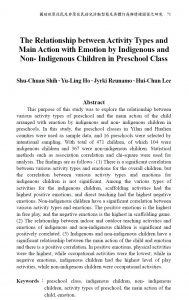 The indgenous people are a minority in Taiwan. The unique characters of their versatile culture is in danger and the families tend to suffer of segregation. The children’s education needs to be enhanced. Professor Elaine Shih and professor Hui-Chun Lee have studied the activities and emotions of the indigenous children by using Progressive Feedback observation. The results show that integrating learning with physical activity and outdoors produces the most positive emotional experiences for these children. The traditional teaching with work at the desk is not enough for these children, they need more versatile ways of learning. The article will be published by Tzu-Chi University publications. The article is in Chinese, but you can easily translate it! Read the article here.
The indgenous people are a minority in Taiwan. The unique characters of their versatile culture is in danger and the families tend to suffer of segregation. The children’s education needs to be enhanced. Professor Elaine Shih and professor Hui-Chun Lee have studied the activities and emotions of the indigenous children by using Progressive Feedback observation. The results show that integrating learning with physical activity and outdoors produces the most positive emotional experiences for these children. The traditional teaching with work at the desk is not enough for these children, they need more versatile ways of learning. The article will be published by Tzu-Chi University publications. The article is in Chinese, but you can easily translate it! Read the article here.
행복한 아이의 비밀
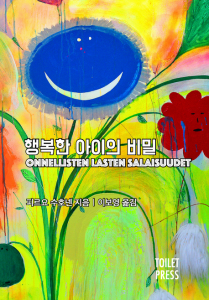 The Secrets of Happy Children, edited by Pirjo Suhonen, has been published in South Korea. In the book, 12 Finnish education and psychology experts reflect on Finnish education. One chapter of the book describes the results of Progressive Feedback described by Jyrki Reunamo. In the article, a child’s happiness and the value of play in building a meaningful life is discussed. Link to the book launch event https://biz.chosun.com/culture/culture_general/2024/05/19/HOTKTFLU75HU3FMSTFP6XGQHIQ/?utm_source=naver&utm_medium=original&utm_campaign=biz. The book can be purchased from the Korean online store https://product.kyobobook.co.kr/detail/S000213303968 or from Aladin https://www.aladin.co.kr/m/mproduct.aspx?ItemId=339583877. The cultures and customs of Finland and Korea differ from each other, but there is also much in common. Rewarding Korean language studies! Thank you for Pirjo Suhonen for her hard but successful work!
The Secrets of Happy Children, edited by Pirjo Suhonen, has been published in South Korea. In the book, 12 Finnish education and psychology experts reflect on Finnish education. One chapter of the book describes the results of Progressive Feedback described by Jyrki Reunamo. In the article, a child’s happiness and the value of play in building a meaningful life is discussed. Link to the book launch event https://biz.chosun.com/culture/culture_general/2024/05/19/HOTKTFLU75HU3FMSTFP6XGQHIQ/?utm_source=naver&utm_medium=original&utm_campaign=biz. The book can be purchased from the Korean online store https://product.kyobobook.co.kr/detail/S000213303968 or from Aladin https://www.aladin.co.kr/m/mproduct.aspx?ItemId=339583877. The cultures and customs of Finland and Korea differ from each other, but there is also much in common. Rewarding Korean language studies! Thank you for Pirjo Suhonen for her hard but successful work!Creativity is woven into the social fabric
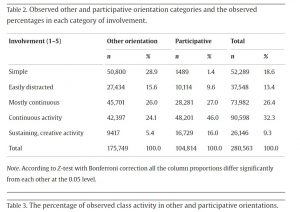 Teemu Nikkola, Jonna Kangas and Jyrki Reunamo have written an article Children’s creative participation as a precursor of 21st century skills in Finnish early childhood education and care context, which has been accepted for publication in the journal Learning and Individual Differences. The data is from Progressive Feedback observation and child evaluations. Children’s creative participation was examined using the social orientation theory together with the LI-SYC to focus on their involvement in class activities. The results showed that children’s creative participation was related to their skills and competencies, involvement, and play as a class activity. The results emphasize the significance of creative participation as an indicator of quality and learning in ECEC. Creativity is not an easy phenomenon for environments, especially in the context of education. Openness of the creative process makes it more difficult to control than a predetermined process. Uncertainty of the result and number of different ideas in creative process must be tolerated. New, different ideas may challenge the norms and achieve resistance. In creative processes, an individual must be considered to be an integral part of a complex social system. Play itself can be understood as a pathway for societal participation when considering participation and scaffolding the development of participatory skills. Scaffolding creative participation in the context and educational culture of ECEC as an open process should be conscious. The table shows the essential connection between creativity and deep learning.
Teemu Nikkola, Jonna Kangas and Jyrki Reunamo have written an article Children’s creative participation as a precursor of 21st century skills in Finnish early childhood education and care context, which has been accepted for publication in the journal Learning and Individual Differences. The data is from Progressive Feedback observation and child evaluations. Children’s creative participation was examined using the social orientation theory together with the LI-SYC to focus on their involvement in class activities. The results showed that children’s creative participation was related to their skills and competencies, involvement, and play as a class activity. The results emphasize the significance of creative participation as an indicator of quality and learning in ECEC. Creativity is not an easy phenomenon for environments, especially in the context of education. Openness of the creative process makes it more difficult to control than a predetermined process. Uncertainty of the result and number of different ideas in creative process must be tolerated. New, different ideas may challenge the norms and achieve resistance. In creative processes, an individual must be considered to be an integral part of a complex social system. Play itself can be understood as a pathway for societal participation when considering participation and scaffolding the development of participatory skills. Scaffolding creative participation in the context and educational culture of ECEC as an open process should be conscious. The table shows the essential connection between creativity and deep learning. 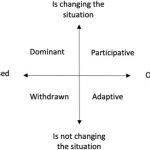 There should be a balanced amount of structure and autonomy in a creative process (click figure to make it bigger). Read the article at https://www.sciencedirect.com/science/article/pii/S104160802400030X.
There should be a balanced amount of structure and autonomy in a creative process (click figure to make it bigger). Read the article at https://www.sciencedirect.com/science/article/pii/S104160802400030X.
Practice of Reading Activities in Taiwanese preschools
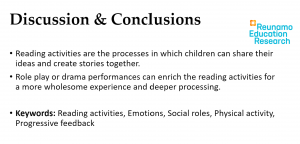 Professor Hui-Hua Chen and professor Jyrki Reunamo presented the results of the Taiwan observation in Frankfurt (International Conference on Early Childhood Education and Teaching Systems). Children spend more time in different, mostly adult-led reading moments than in Finland (half an hour a day), so reading is an important part of children’s everyday life, just because of the quantity. However, the quality needs enhancements. Reading situations are used sparingly from the point of view of children’s emotions, sociality, and learning. The pedagogical possibilities of reading situations are used to little advantage. Unfortunately, children often remain passive recipients in reading situations, and the images evoked by the book are not evoked in group processes.
Professor Hui-Hua Chen and professor Jyrki Reunamo presented the results of the Taiwan observation in Frankfurt (International Conference on Early Childhood Education and Teaching Systems). Children spend more time in different, mostly adult-led reading moments than in Finland (half an hour a day), so reading is an important part of children’s everyday life, just because of the quantity. However, the quality needs enhancements. Reading situations are used sparingly from the point of view of children’s emotions, sociality, and learning. The pedagogical possibilities of reading situations are used to little advantage. Unfortunately, children often remain passive recipients in reading situations, and the images evoked by the book are not evoked in group processes.
Chen, Hui-Hua & Reunamo, J. (2024). Comprehension and Practice of Reading Activities in Taiwanese preschools. International conference on early childhood education and teaching systems (ICECETS-24). 8. tammikuuta 2024. Frankfurt, Germany.
FERA Conference on Education 2023
At the 2023 FERA Conference on Education in Vaasa, there were two presentations based on Progressive Feedback data:
Syrjämäki, M., Reunamo, J., Pesonen, H., Pirttimaa, R., & Kontu, Elina. Autistisen lapsen sitoutuneisuus varhaiskasvatuksen toimintaympäristössä [The involvement of autistic child in early childhood education].
Lahtinen, L., Fonsén, E., Heikonen, L., Kallioniemi, A. & Reunamo, J. Johtajuuden ulottuvuudet ja niihin liittyvät ilmiöt varhaiskasvatuksessa [The dimensions of leadership and their relations to the unit descriptors].
Taiwanese aboriginal children
 About three percent of Taiwan’s natives are Taiwanese aboriginals, who have inhabited Taiwan at least 6,500 years before the arrival of other nationalities, primarily Chinese. The official number of tribes is 16. The indigenous peoples have suffered for centuries from economic and social discrimination. The segregation is still visible in today’s early childhood education in Taiwan. Dong Hwa University held a conference on 4.11.23 2023 Quality early childhood education conference: Embracing diversity, multidisciplinarity and compassion for the underprivileged. In the keynote presentation, Jyrki Reunamo described the results acquired by using Progressive Feedback observation. The data consisted of 2189 observations of the indigenous peoples of the Hualien region. The results clearly showed the difficulties in learning, rarer than usual experiences of happiness, few participating and less influential activities in the learning environment. Furthermore, teachers paid less personal attention to the aboriginal children. In addition, relationships with other children remained looser. The results describe the marginalized position of children with indigenous backgrounds and a looser shared interest. These children need more co-developing content in early childhood education.
About three percent of Taiwan’s natives are Taiwanese aboriginals, who have inhabited Taiwan at least 6,500 years before the arrival of other nationalities, primarily Chinese. The official number of tribes is 16. The indigenous peoples have suffered for centuries from economic and social discrimination. The segregation is still visible in today’s early childhood education in Taiwan. Dong Hwa University held a conference on 4.11.23 2023 Quality early childhood education conference: Embracing diversity, multidisciplinarity and compassion for the underprivileged. In the keynote presentation, Jyrki Reunamo described the results acquired by using Progressive Feedback observation. The data consisted of 2189 observations of the indigenous peoples of the Hualien region. The results clearly showed the difficulties in learning, rarer than usual experiences of happiness, few participating and less influential activities in the learning environment. Furthermore, teachers paid less personal attention to the aboriginal children. In addition, relationships with other children remained looser. The results describe the marginalized position of children with indigenous backgrounds and a looser shared interest. These children need more co-developing content in early childhood education.
The research team in Taiwan included Hui-Chun Lee (Tzu-Chi University), Li-Chen Wang (Chang Gung University), Hui-Hua Chen (Dong Hwa University) and Shu-Shuan Shih (Taitung University).
Dimensions of Art Education
 The International Conference of Aesthetics Education for Young Children was held in Shih Chien University, Taipei. In his keynote presentation, Jyrki Reunamo reviewed three wonderful art education videos about visual arts, music, and drama. The videos show wonderful ways for teachers to introduce the world of arts to children. Reunamo also presented his model of art education (click the picture to enlarge it). In the model, there are four functions for art in education. The first is to express and enjoy the world of art and its heritage. The second are the created personal orientations for different art. The third function is the mastering of art (doing it right). The fourth function is a community-enriching shared creation of art. The presentation can be viewed at https://www.youtube.com/watch?v=Mo8kDineJLs
The International Conference of Aesthetics Education for Young Children was held in Shih Chien University, Taipei. In his keynote presentation, Jyrki Reunamo reviewed three wonderful art education videos about visual arts, music, and drama. The videos show wonderful ways for teachers to introduce the world of arts to children. Reunamo also presented his model of art education (click the picture to enlarge it). In the model, there are four functions for art in education. The first is to express and enjoy the world of art and its heritage. The second are the created personal orientations for different art. The third function is the mastering of art (doing it right). The fourth function is a community-enriching shared creation of art. The presentation can be viewed at https://www.youtube.com/watch?v=Mo8kDineJLs
Early education experience increases children’s social influence
 Aada Heikkilä’s study examines the connection between the years that children spent in early childhood education and care (ECEC) and their social orientations and main objects of attention. The data were collected within the Progressive Feedback project by observing children: 20,457 observations of 972 six-year-olds from 360 child groups in Finland. According to the results, the years children spent in ECEC have a connection to their social orientations and main objects of attention, and differences between genders were discovered. The longer the children had attended ECEC, the less adaptive orientation was observed. The children that had attended ECEC for under a year were observed to be the least participative. Dominant orientation increased the longer the children had attended ECEC. Those that had been in ECEC for more than four years rarely paid attention to non-social objects and adults and often paid attention to several children.
Aada Heikkilä’s study examines the connection between the years that children spent in early childhood education and care (ECEC) and their social orientations and main objects of attention. The data were collected within the Progressive Feedback project by observing children: 20,457 observations of 972 six-year-olds from 360 child groups in Finland. According to the results, the years children spent in ECEC have a connection to their social orientations and main objects of attention, and differences between genders were discovered. The longer the children had attended ECEC, the less adaptive orientation was observed. The children that had attended ECEC for under a year were observed to be the least participative. Dominant orientation increased the longer the children had attended ECEC. Those that had been in ECEC for more than four years rarely paid attention to non-social objects and adults and often paid attention to several children.
As both participative and dominant social orientations include impacting the learning environment in early education, we can conclude that children with more years in early are education are more agentive in comparison to children with less time in early education. The results can be seen in the Table (click it to enlarge it). The observers did not know how long the children had spent time in early education, which mean that the found differences are not based on the observers presuppositions. The results are statistically significant. All in all, the more time you spend in early education, the more agency you have in social situations!
Aada Heikkilä & Jyrki Reunamo (2023) The years children spent in early education in relation to their social relations and objects of attention, European Early Childhood Education Research Journal, DOI: 10.1080/1350293X.2023.2254534
Evaluation of children’s well-being
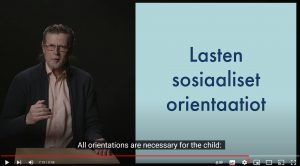 The National Network for Developing Assessment Literacy KAARO has made a video about the evaluation of children’s well-being in early childhood education. The video shows the four cornerstones of well-being, which are learning, movement, emotions, and social orientations, as well as their assessment. In addition, we consider the whole of well-being as part of the diverse hierarchical structure of early childhood education. The video can be viewed at https://youtu.be/bgcecbirjwM . From the settings select English subtitles.
The National Network for Developing Assessment Literacy KAARO has made a video about the evaluation of children’s well-being in early childhood education. The video shows the four cornerstones of well-being, which are learning, movement, emotions, and social orientations, as well as their assessment. In addition, we consider the whole of well-being as part of the diverse hierarchical structure of early childhood education. The video can be viewed at https://youtu.be/bgcecbirjwM . From the settings select English subtitles.
Practicum studies for Taiwanese students in Finnish early education
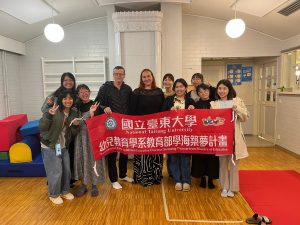 Taiwanese students from Taitung University did their practicum studies in Heikkilän päiväkoti, Kerava. The students showed remarkable sensitivity and consideration to support children and pedagogy. A big thank you to director Johanna Nevala for making it all possible. Special thank you to the staff introducing Finnish early education to the students!
Taiwanese students from Taitung University did their practicum studies in Heikkilän päiväkoti, Kerava. The students showed remarkable sensitivity and consideration to support children and pedagogy. A big thank you to director Johanna Nevala for making it all possible. Special thank you to the staff introducing Finnish early education to the students!